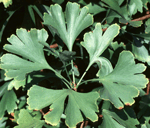Back to: Health Information : Health Topics A–Z
Ginkgo

© Steven Foster
On this page
- Introduction
- What It Is Used For
- How It Is Used
- What the Science Says
- Side Effects and Cautions
- Sources
- For More Information
Introduction
This fact sheet provides basic information about the herb ginkgo—common names, uses, potential side effects, and resources for more information. The ginkgo tree is one of the oldest types of trees in the world. Ginkgo seeds have been used in traditional Chinese medicine for thousands of years, and cooked seeds are occasionally eaten.
Common Names—ginkgo, Ginkgo biloba, fossil tree, maidenhair tree, Japanese silver apricot, baiguo, bai guo ye, kew tree, yinhsing (yin-hsing)
Latin Name—Ginkgo biloba
What It Is Used For
- Ginkgo leaf extract has been used to treat a variety of ailments and conditions, including asthma, bronchitis, fatigue, and tinnitus (ringing or roaring sounds in the ears).
- Today, people use ginkgo leaf extracts hoping to improve memory; to treat or help prevent Alzheimer's disease and other types of dementia; to decrease intermittent claudication (leg pain caused by narrowing arteries); and to treat sexual dysfunction, multiple sclerosis, tinnitus, and other health conditions.
How It Is Used
Extracts are usually taken from the ginkgo leaf and are used to make tablets, capsules, or teas. Occasionally, ginkgo extracts are used in skin products.
What the Science Says
- Numerous studies of ginkgo have been done for a variety of conditions. Some promising results have been seen for intermittent claudication, but larger, well-designed research studies are needed.
- An NCCAM-funded study of the well-characterized ginkgo product, EGb-761, found it ineffective in lowering the overall incidence of dementia and Alzheimer's disease in the elderly. In this clinical trial, known as the Ginkgo Evaluation of Memory study, researchers recruited more than 3,000 volunteers age 75 and over who took 240 mg of ginkgo daily. Participants were followed for an average of approximately 6 years.
- Some smaller studies for memory enhancement have had promising results, but a trial sponsored by the National Institute on Aging of more than 200 healthy adults over age 60 found that ginkgo taken for 6 weeks did not improve memory.
- Other NCCAM-funded research includes studies on ginkgo for asthma, symptoms of multiple sclerosis, vascular function (intermittent claudication), cognitive decline, sexual dysfunction due to antidepressants, and insulin resistance. NCCAM is also looking at potential interactions between ginkgo and prescription drugs.
Side Effects and Cautions
- Side effects of ginkgo may include headache, nausea, gastrointestinal upset, diarrhea, dizziness, or allergic skin reactions. More severe allergic reactions have occasionally been reported.
- There are some data to suggest that ginkgo can increase bleeding risk, so people who take anticoagulant drugs, have bleeding disorders, or have scheduled surgery or dental procedures should use caution and talk to a health care provider if using ginkgo.
- Uncooked ginkgo seeds contain a chemical known as ginkgotoxin, which can cause seizures. Consuming large quantities of seeds over time can cause death. Ginkgo leaf and ginkgo leaf extracts appear to contain little ginkgotoxin.
- Tell your health care providers about any complementary and alternative practices you use. Give them a full picture of what you do to manage your health. This will help ensure coordinated and safe care.
Sources
- DeKosky ST, Williamson JD, Fitzpatrick AL, et al. Ginkgo biloba for prevention of dementia: a randomized controlled trial. Journal of the American Medical Association. 2008;300(19):2253–2262.
- De Smet PA. Herbal remedies. New England Journal of Medicine. 2002;347(25):2046–2056.
- Solomon PR, Adams F, Silver A, et al. Ginkgo for memory enhancement: a randomized controlled trial. Journal of the American Medical Association. 2002;288(7):835–840.
- Ginkgo biloba. In: Coates P, Blackman M, Cragg G, et al., eds. Encyclopedia of Dietary Supplements. New York, NY: Marcel Dekker; 2005:249–257.
- Ginkgo. Natural Medicines Comprehensive Database Web site. Accessed on July 2, 2007.
- Ginkgo (Ginkgo biloba L.). Natural Standard Database Web site. Accessed on June 28, 2007.
- Ginkgo biloba leaf extract. In: Blumenthal M, Goldberg A, Brinckman J, eds. Herbal Medicine: Expanded Commission E Monographs. Newton, MA: Lippincott Williams & Wilkins; 2000:359–366.
For More Information
- What's in the Bottle? An Introduction to Dietary Supplements
- Herbal Supplements: Consider Safety, Too
NCCAM Clearinghouse
The NCCAM Clearinghouse provides information on CAM and NCCAM, including publications and searches of Federal databases of scientific and medical literature. The Clearinghouse does not provide medical advice, treatment recommendations, or referrals to practitioners.
Toll-free in the U.S.: 1-888-644-6226
TTY (for deaf and hard-of-hearing callers): 1-866-464-3615
Web site: nccam.nih.gov
E-mail:
PubMed®
A service of the National Library of Medicine (NLM), PubMed contains publication information and (in most cases) brief summaries of articles from scientific and medical journals. CAM on PubMed, developed jointly by NCCAM and NLM, is a subset of the PubMed system and focuses on the topic of CAM.
Web site: www.ncbi.nlm.nih.gov/sites/entrez
CAM on PubMed: nccam.nih.gov/camonpubmed/
NIH Office of Dietary Supplements
Web site: www.ods.od.nih.govNIH National Library of Medicine's MedlinePlus
Ginkgo Listing: www.nlm.nih.gov/medlineplus/druginfo/natural/patient-ginkgo.htmlThis publication is not copyrighted and is in the public domain. Duplication is encouraged.
NCCAM has provided this material for your information. It is not intended to substitute for the medical expertise and advice of your primary health care provider. We encourage you to discuss any decisions about treatment or care with your health care provider. The mention of any product, service, or therapy is not an endorsement by NCCAM. |
NCCAM Publication No. D290
Created September 2005
Updated November 2008
Note: The PDF file requires a viewer such as Adobe Reader, which you can download free of charge from the Adobe Web site.
